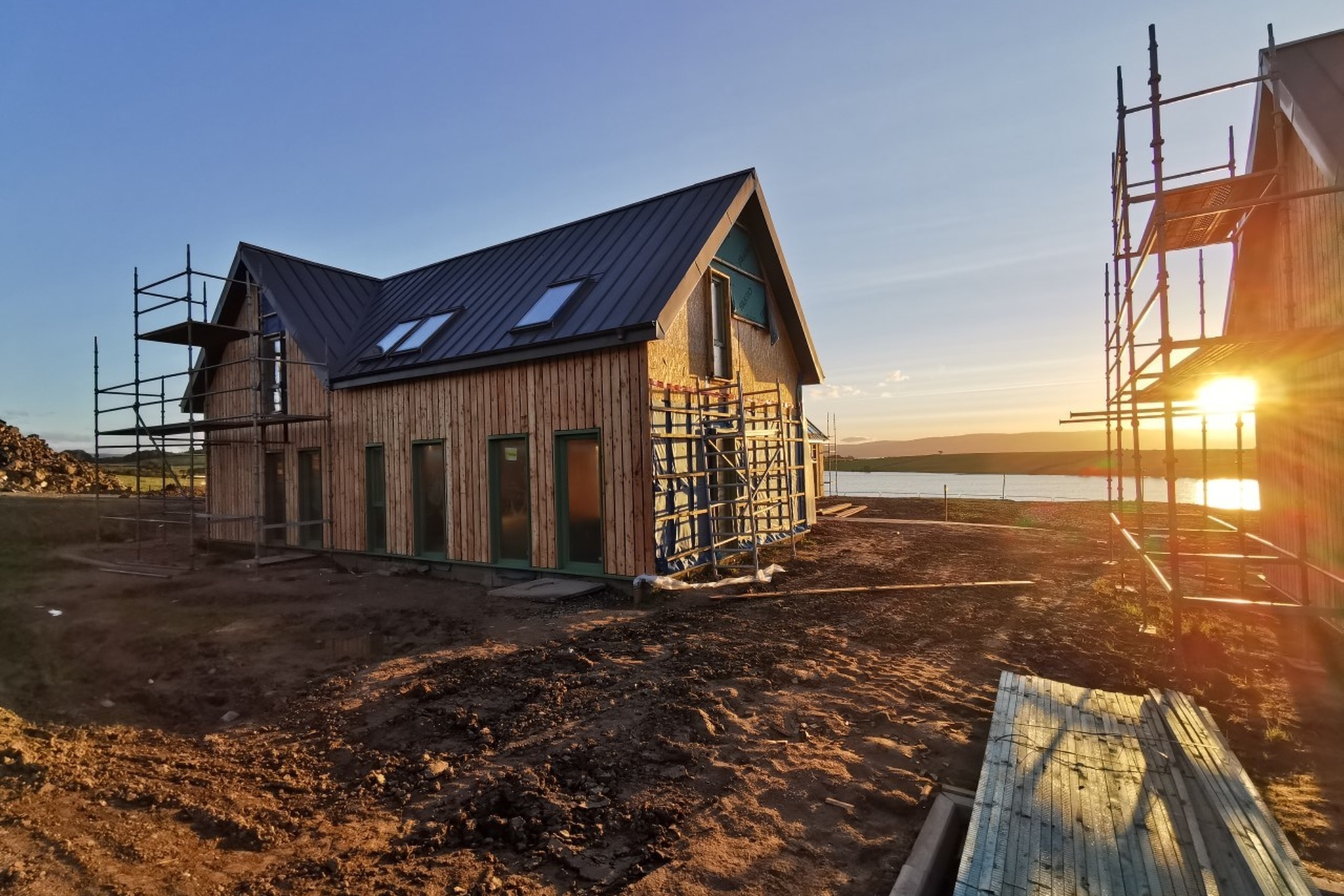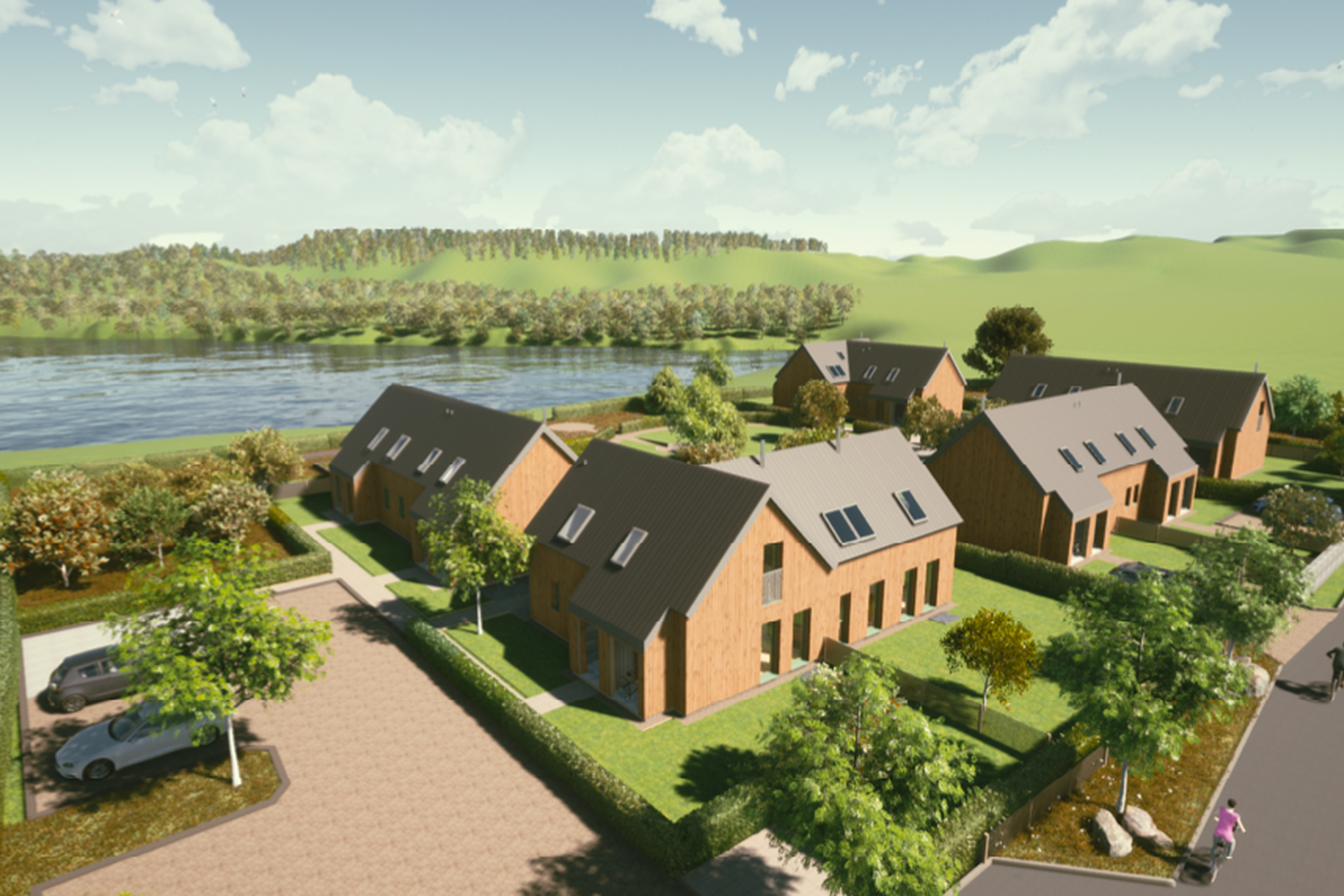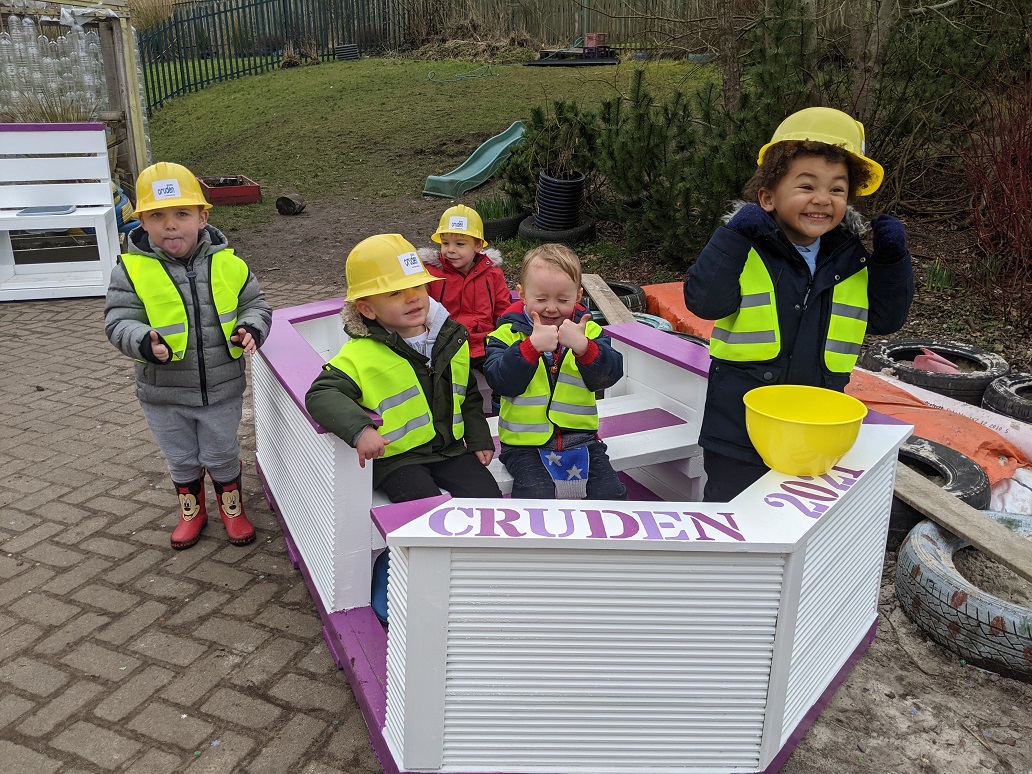Building Briefs - March 16th
- Ise of Bute eco starter homes near completion
The promise of affordable idyllic island life awaits ten lucky householders as a new neighbourhood nears completion on the Isle of Bute.

Mount Stuart Trust is inviting prospective tenants to apply to live in one of ten new eco starter homes built on the shores of Loch Ascog and just a short walk from the town of Rothesay.
This new development comprises six two-bedroom and four three-bedroom low energy eco-homes developed at the site of the old Lochend Farm, located just a field away from the stunning Loch Ascog.
With community living at the development’s heart, a significant importance has been placed on prospective tenants having the drive to get involved with community-led projects at Lochend, such as creating allotments, orchards and other beneficial activities. As part of the sustainable living approach, an area of ground has also been set aside for these purposes, in order to allow prospective residents to take a further step towards self-sustaining, sustainable living. It is hoped that some traditional skills events could also be hosted by the Lochend Community.
Designed as starter homes, each property will be available for private rent with an integral low energy design strategy keeping utilities bills to a minimum. The Trust anticipates that the mid-market rental levels and low utility bills on these homes makes them extremely attractive to prospective tenants.
Working alongside local architects ARCHITECO, Mount Stuart Trust have sought to create homes of striking architectural significance. The houses have been built to Passivhaus Low Energy Building Standards, with each property highly insulated and triple glazed, meaning no traditional heating system is required.
Cleverly designed, each property boasts bright and airy interiors thanks to a combination of skylights and drop height windows, which also affords uninterrupted views across the neighbouring fields and countryside. Furthermore, tenants can expect to enjoy magnificent views over Loch Ascog, leading onto the Firth of Clyde and towards Arran too.

The site features extensive shared communal spaces such as a fire pit, BBQ areas, and play areas, along with private gardens for every home. Lochend is leading the way for good quality, affordable, low energy, sustainable living on the Isle of Bute. In addition to its picturesque rural location, Lochend is within walking distance to the town of Rothesay and the joint campus for school and college.
Mount Stuart Trust is now seeking initial applications of interest from people who would like to live in this development. As both a sought after place to live for island inhabitants, and an attractive proposition for those considering the Isle of Bute as a place to live, the Trust is keen to encourage applications from both locals and newcomers.
A preference will be given to those with an idea to promote the island and a community led approach to furthering sustainable living on Bute. For further information, and how to apply please see the online application form here.
- Moray Council formally adopts Climate Change Strategy
An action plan to secure carbon neutral status for Moray Council has been approved.
The strategy and action plan follows the Climate Emergency declared in June 2019 and aims to make the council carbon neutral by 2030.
Actions include improving energy efficiency across the council’s estate to have all buildings operated and owned by the council – including schools - achieve a net zero carbon target by 2030. Increasing electric vehicle charging points, active travel and sustainability and recycling in schools also forms part of the aspirations.
A dedicated team will progress the work monitoring and reducing the carbon footprint from council buildings, vehicles and switching to renewable energy supplies. Climate change and biodiversity considerations will become standard in all future council reports and development masterplans, with the new team also tackling awareness raising and behavioural change in the community.
A number of changes have already been introduced within the council including: embedding the targets, aims and aspirations of the Climate Change Strategy within Moray Council’s Corporate Plan; making school meals more sustainable with a reduced carbon impact; identifying opportunities for food production, renewable energy and woodland planting; a policy on coastal change in Local Development Plan; additional guidance on sustainable design and construction; a Planning Condition introduced for developers to report on their actions to reduce carbon emissions from building stage to completed development.
- European Rental Association releases new and improved ERA Equipment CO2 Calculator
The European Rental Association (ERA) has released a new and improved ERA Equipment CO2 Calculator, which now allows users to directly compare two separate scenarios for using construction equipment.
Michel Petitjean, ERA secretary general, said: “By providing direct comparisons of distinct scenarios, it is much easier for equipment stakeholders to evaluate different options when using construction equipment. This means that they can make the most sustainable choices and minimise their impact on the environment.”
The ERA Equipment CO2 Calculator was first released in January 2021 and is a free-to-use online tool to enable equipment stakeholders to make more sustainable choices when using construction equipment.
The Calculator determines the carbon footprint of construction equipment over its entire lifecycle and is applicable to all types of equipment, from mini excavators and wheel loaders to generators, boom lifts and access platforms.
The results provide an estimate of the carbon footprint per hour of use, allowing construction equipment users to, for example, compare different use scenarios, investigate which part of the lifecycle contributes most to the carbon footprint and evaluate the effects of alternative fuel choices.
The Calculator can be used to evaluate a single ownership period of one piece of equipment and, furthermore, to determine the climate impact of entire fleets of equipment or the total carbon footprint of all machines on a given construction site.
Try the ERA Equipment CO2 Calculator here and read more about it in the user guide.
- Cruden Building lends helping hand to Rainbow Family Centre
Cruden Building has lent a helping hand to the Rainbow Family Centre in Port Glasgow, Inverclyde, by donating and building several new pieces of outdoor equipment for their nursery children to enjoy.

The local nursery approached Cruden, who are building the new affordable housing development of 170 flats and 54 houses for River Clyde Homes at the nearby site of the former St Stephen’s school.
Cruden Building donated materials and built the new and engaging outdoor equipment to boost the nursey’s outdoor learning space for the children and to improve their shared playground space. The equipment, which includes mud kitchens, water activity walls, an outdoor den and a new large seating bench, will allow the children to get closer to nature and enjoy playing outdoors.
This is the latest development in River Clyde Homes’ ambitious plans to build up to 750 new homes over the next five years and the first of ‘RCH+’ standard, where all properties will have a common design standard, across all future new build sites.
- Temporary renewals implemented for lightning conductor engineer and steeplejack CSCS Cards
The Association of Technical Lightning & Access Specialists’ (ATLAS) Council has voted in favour of temporarily amending the standard CSCS card renewal requirements for its sector, due to coronavirus severely restricting access to training.
This has meant the suspension of the requirement for an Anchors for Steeplejacks and/or Working at Height for Lightning Conductor Engineer course in order to renew blue or gold Steeplejack and/or Lightning Conductor Engineer CSCS cards.
As a result, on a temporary basis, the Health, Safety & Environment Specialist Work at Height Test will be sufficient to renew a CSCS card, but this will be valid for one year only.
As face-to-face training is significantly restricted, due to lockdown restrictions, the Anchors for Steeplejacks and Working at Height for Lightning Conductor Engineer courses are currently suspended. The courses were assessed for remote or eLearning conversion, but this created significant logistical challenges, which may take some time to resolve.
ATLAS understands that the grace period of one-year on expired cards, offered by CSCS, is fast approaching for many at the end of March. To allow members to carry on accessing sites during this period, ATLAS has worked with CSCS to allow the issuing of short-term CSCS cards until training can resume, or alternative training formats can be implemented.
The short-term CSCS cards will be valid for one year only, so operatives will then need to renew again, for their five-year CSCS card, when the relevant courses can resume. The cost to renew a CSCS card remains the same regardless of the duration, so the cost to renew will remain at £36.00. This temporary implementation came into force from March 15 and is expected to be in place for no longer than one year.
Operatives are advised to access the relevant Anchors for Steeplejacks and/or Working at Height for Lightning Conductor Engineers courses as soon as they become available (which can be used for CSCS card renewals for up to two years following the course date). Any operatives who managed to attend the training courses, prior to the latest restrictions, will be able to obtain five-year CSCS cards as normal (as long as the certificates are dated no more than two years before the renewal).










